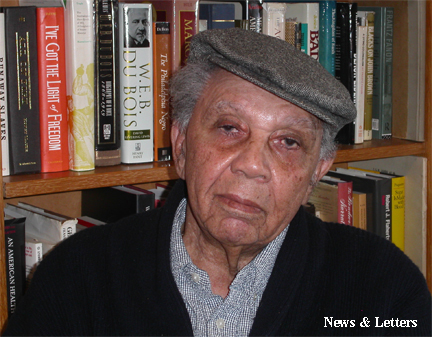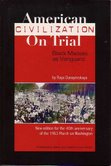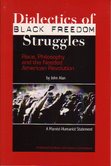|














|
|
|
NEWS & LETTERS, March - April 2011
Black/Red View
John Alan/Allen Willis

Allen Willis/John Alan--who would have been 95 on June 10 this year--died quietly on Feb. 23 in Oakland, California. The near-century of his life was filled with thoughts and experiences of Black life in America. One of his earliest recollections was as a three-year-old witnessing the 1919 race riots, seeing Black men being attacked and beaten by out-of-control whites. One of his last recorded interviews was on Nov. 17, 2008, concerning his thoughts on the election of Barack Obama as the first African-American U.S. president, about which Alan had concluded, "…no great change ever comes from Congress or the White House. It comes from the people's struggle for freedom.…" The transcript of that interview by Mel Vapour of the East Bay Media Center was printed in our February-March 2009 "Black/Red View" column. While Alan was well-known as a distinguished filmmaker--having been called "the dean of African-American filmmakers" in the Bay Area film community, and "one of the unknown geniuses of the documentary film" in the world at large--he was known best to the friends and readers of News & Letters as the author of the "Black/Red View" column that appeared in every issue from 1970 through to today, under the pen name of John Alan.
Alan's death was a great loss to us all. While he was a revolutionary activist and writer since his youth in Washington, D.C., it was Raya Dunayevskaya's insistence that his thoughts had to be written to be shared by all, that brought that Black/Red View column into existence, after the extraordinary Black/Red Conference that was sponsored by News and Letters Committees in 1969. What was extraordinary was not only that the 59 participants represented Black and white as well as Mexican-American activists in the freedom movement--young and old, workers and students, women and men, members of varied organizations--but that they discussed for six full hours almost every question raised in the Black community at that moment.
What was made front and center was the way that discussion helped Raya Dunayevskaya to complete her book Philosophy and Revolution, published in 1973. As expressed by Charles Denby, author of Indignant Heart: a Black Worker's Journal, in his welcome to that Conference, "This is the first time such a conference will have a chance to discuss with each other as well as with Marxist-Humanists who lend the red coloring, not only for the sake of color, but for the sake of philosophy, a philosophy of liberation." It was that quality of Black/Red that John Alan had presented in his column ever since 1970.
Many paths crossed in John Alan's life. He had been born in Washington, D.C. to a Black mother and a German father, and as a child had attended the Lucretia Mott Quaker-Abolitionist elementary school, which he recalled as decorated with murals of a Black Civil War regiment. As a youth, in the 1930s, he formulated his political and cultural roots with the many Washington, D.C., intellectuals and artists, like Langston Hughes, and was attracted to socialist views during the Depression by attending forums where socialist ideas were debated. It was at one such meeting organized by Raya Dunayevskaya that he was drawn to her ideas because she kept inviting Black intellectuals from Howard University as speakers.
Searching for a job during the Depression took him to Chicago, where he crossed paths with writers like Richard Wright. He plunged into the lively forums in Hyde Park and the struggles against restrictive covenants that barred African-Americans from living in "white" neighborhoods. It was during those actions that he met Lillian Bender, the woman who was his wife for over 50 years until her death. After World War II they moved to San Francisco, where Alan's achievements as a renowned filmmaker brought him many awards. The most notable achievement that demands our attention was his filming of the historic "The Other America" speech by Martin Luther King at Stanford University on April 14, 1967. It was one of the first speeches where he came out against the Vietnam War.
Whether it was Alan's work on catching that moment, or his recording of East Oakland youth reciting their poetry as "Can You Hear Me?" or of Bobby Seale in the San Francisco jail caught powerfully in "Stagger Lee," all can be seen as other expressions of what became concretized in the title of his News & Letters column, "Black/Red View." That was also what charactorized his contribution to the pamphlet he co-authored, Frantz Fanon, Soweto, and American Black Thought. Most important of all his achievements in that regard is the book he authored in 2003 as Dialectics of Black Freedom Struggles: Race, Philosophy, and the Needed American Revolution. A memorial meeting for Allen John Willis (John Alan) will be held at the Niebyl-Proctor Library, 6501 Telegraph Ave, Oakland, Calif., Saturday, April 2, at 1:00 p.m.
We are proud to list him as a National Editorial Board Member Emeritus in the masthead of News & Letters. We mourn his passing and greatly honor his life.
--Olga Domanski
|



* * *

Subscription for one year
$5
|

